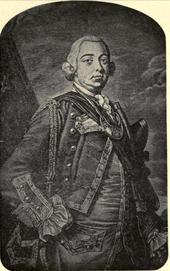Robert Monckton
Robert Monckton (born June 24, 1726 in Yorkshire , England , † May 21, 1782 in London , England) was a British general and colonial administrator. Among other things, he was colonial governor of the province of New York in 1762 and 1763 .
Life
Robert Monckton was the second son of the British aristocrat John Monckton (1695-1751). From 1741 he served in various units in the British military. He took part in the War of the Austrian Succession . In the meantime he was stationed in Flanders . In 1745 he was also used in the suppression of a Stuart rebellion under Charles Edward Stuart . By 1752 he had already made it to lieutenant colonel. In the same year he was a member of the British Parliament for the first time for a short time. But he gave up his seat to continue his military career. He was transferred to Novia Scotia, where he was in command of Fort Lawrence, which was on the border with the French Acadia . In 1753 he was appointed to the colonial government council in Halifax .
During the Seven Years War he took part in several battles in America. Most took place in the northeast in the Novia Scotia area. But he was involved in the successful expedition against Martinique in 1762 . In the same year he was appointed the new colonial governor of the province of New York. He officially held this office until 1765. De facto, however, he left the colony for England in 1763. The office of colonial governor of New York was held in the meantime by Cadwallader Colden , who held this office even before Monckton took office. Between 1765 and 1778 Monckton was governor of Berwick-upon-Tweed . Since 1770 he held the rank of lieutenant general. He unsuccessfully sought his appointment as British commander for India . Instead, he was offered the position of commander of British units in North America, which he declined. In 1778 Robert Mockton was appointed governor of Portsmouth . He held this office until his death in 1782. He was also a member of the British Parliament from 1778 and until his death. In 1779 he organized the defense of Portsmouth against a planned naval attack by the Spaniards and the French. This plan of the opposing military was not implemented.
Web links
- Robert Monckton in the database of Find a Grave (English)
- Monckton at Militaryheritage.com
- Monckton at The History of Parliament
- Monckton in the Dictionary of Canadian Biography
| personal data | |
|---|---|
| SURNAME | Monckton, Robert |
| BRIEF DESCRIPTION | General and Governor of the English colony of New York |
| DATE OF BIRTH | June 24, 1726 |
| PLACE OF BIRTH | Yorkshire , England |
| DATE OF DEATH | May 21, 1782 |
| Place of death | London , England |

